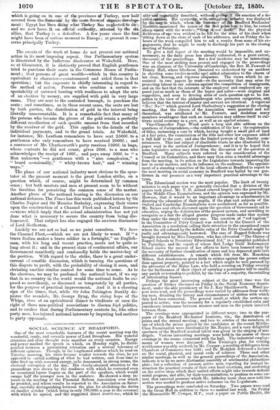The events of the week at home do not present
our national action in its most imposing aspect. Our Parliamentary system is illustrated by the ludicrous disclosures at Wakefield. Here, as at Gloucester, it is distinctly proved that English gentlemen tried to purchase their seats in the Commons House of Parlia- ment ; that persons of great wealth—which in this country is equivalent to character—countenanced and aided them in that operation ; but the exposure is chiefly interesting in regard to the method of action. Persons who combine a certain re- spectability of outward bearing with readiness to adopt the arts of an election by money, are supplied with gold in very large sums. They are sent to the contested borough, to purchase the seats ; and sometimes, as in these recent eases, the seats are lost' by both parties, the distribution of gold in the interval being literally unaccountable. It is a remarkable fact that many of the persons who became the givers of the gold retain a perfectly different recollection of each specific amount from that recorded by the receiver of the gold. This applies to the details of the individual payments, and to the grand totals. At Wakefield, for instance, Mr. Leatham remembers to have sent 25001. to a gentleman who only remembers to have received 20001. ; and a canvasser of Mr. Charlesworth's party receives 13001. in bags, whose contents he did not count, gives 2001. to a man who acknowledges the receipt of 1001., and pays away 5001. to " a Man unknown "—a gentleman with a " nice complexion," a " beard occasionally," " whity-brown hair," and " winning. ways."
The phase of our national industry most obvious to the spec- tator at the present moment is the great London strike, on a question which, of course, might be determined by common sense ; but both masters and men at present seem to be without the faculties for perceiving the common sense of the matter. Another phase of the national bearing is the discussion on our national defences. The Times has this week published letters by Sir Charles Napier and Sir Maurice Berkeley, expressing their views upon the construction of a Channel Fleet and a Naval Reserve —views which imply that the actual administration has not yet done what is necessary to secure the country from being dis- honoured. That subject has also engaged the anxious discussion of Lord Hatherton.
Luckily we are not so bad as we paint ourselves. We have the Channel Fleet,—which we are not likely to want. If " a brave Italian makes a brave soldier in a fortnight," an English- man, with his long and recent practice, needs not be quite so long about it ; and in the present state of continental affairs, our Government manifestly and confessedly holds the master-key of the position. With regard to the strike, there is a great under- current of sensible discussion, which is turning the questions of this dispute to profit, with the probability of closing it soon, and obviating another similar contest for some time to come. As to the elections, we may be pardoned the national boast, if we say that in no country in the world would the national faults be ex- posed so mercilessly, or discussed so temperately by all parties, for the purpose of practical improvement. And it is a cheering sign of the times, that, while Sir John Pakington frankly de- plores the scandals, Mr. George Byng, the rising hope of the Whigs, rises at an agricultural dinner to vindicate at once the right of those non-political associations to discuss high politics, and to confess that during Parliamentary contests he, like other party men, has injured national interests by imputing bad motives to party opponents.


























 Previous page
Previous page